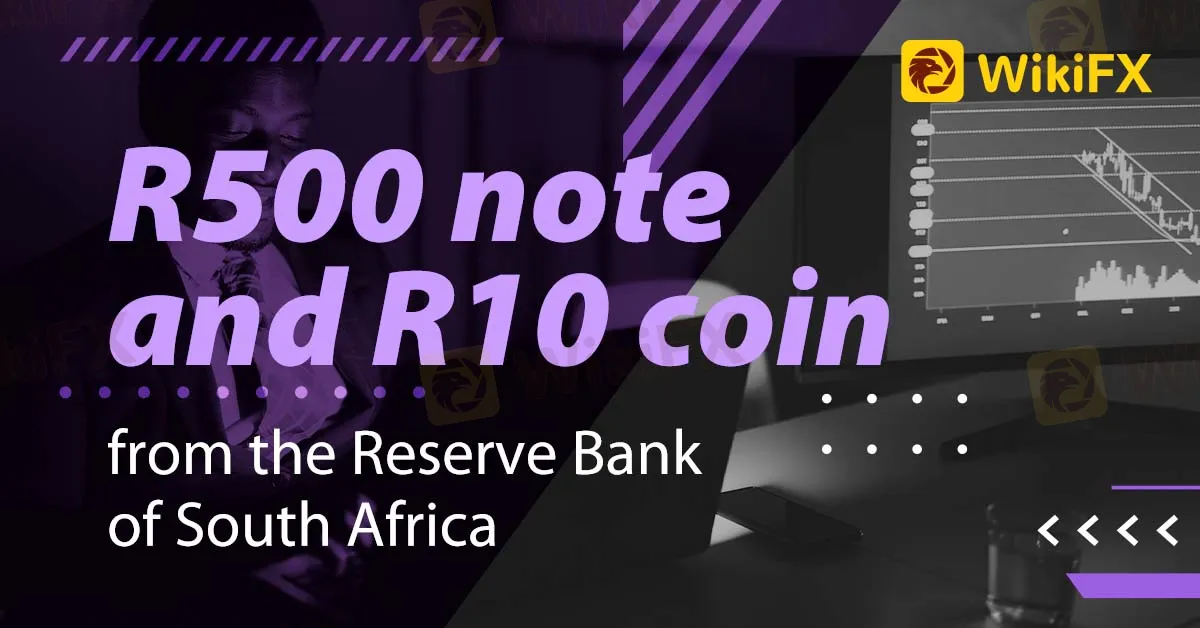简体中文
繁體中文
English
Pусский
日本語
ภาษาไทย
Tiếng Việt
Bahasa Indonesia
Español
हिन्दी
Filippiiniläinen
Français
Deutsch
Português
Türkçe
한국어
العربية
R500 note and R10 coin from the Reserve Bank of South Africa
Abstract:There is considerable discussion over whether the nation should consider issuing bigger denomination coins and notes as South Africans struggle with rising inflation and rising costs of life.

There is considerable discussion over whether the nation should consider issuing bigger denomination coins and notes as South Africans struggle with rising inflation and rising costs of life.
According to the South African Reserve Bank, ongoing study is being done to decide whether to switch to the higher value coin. It said that this involves the introduction of the R10 and bigger value bills like the R500.
The (most recent) study's findings indicated that South Africa is not prepared to introduce an R500 banknote, and among the reasons given were that the introduction is only valid when the largest denomination—in our instance, R200—is the most widely used currency.
However, this is not the situation in South Africa, where the R100 banknote is the most widely used. The R200 is still utilized as a store of value, which is another factor that disqualifies a change, according to the bank.
The Reserve Bank's investigation concluded that there is an economic basis for launching a R10 coin, but the public does not appear to be interested in doing so.
The SARB weighs the rand's purchasing power, the overall direction of inflation, and public opinion when deciding whether or not to switch to new denominations.
According to data released at the end of 2021, there were an average of 776.6 million physical banknotes in circulation outside of the SARB between March 2020 and June 2021, making the R100 denomination the most popular in terms of volume.
The R200 denomination came next, with an average of 307.3 million banknotes being in circulation at the same time.
The majority of other banknote denominations that were in circulation during this time period “remain[ed] rather steady, but the quantity of coins in circulation outside of the SARB by far exceeded that of banknotes, due to the variety of minor values,” according to the central bank.

Disclaimer:
The views in this article only represent the author's personal views, and do not constitute investment advice on this platform. This platform does not guarantee the accuracy, completeness and timeliness of the information in the article, and will not be liable for any loss caused by the use of or reliance on the information in the article.
Read more

FCA Identifies Clone Firm Exploiting Admiral Markets' Credibility
The UK Financial Conduct Authority (FCA) has issued a public warning regarding a fraudulent entity impersonating Admiral Markets, a legitimate and authorised trading firm. The clone firm, operating under the name Admiral EU Brokers and the domain Admiraleubrokerz.com, has been falsely presenting itself as an FCA-authorised business.

Malaysian Man Loses RM113,000 in Foreign Currency Investment Scam
A 57-year-old Malaysian man recently fell victim to a fraudulent foreign currency investment scheme, losing RM113,000 in the process. The case was reported to the Commercial Crime Investigation Division in Batu Pahat, which is now investigating the incident.

FCA Alerts Traders to New List of Unregulated and Clone Brokers
Protect your investments! Learn about unregulated firms flagged by the FCA and discover how WikiFX helps traders avoid scams and choose legitimate brokers.

The Funded Trader: Reactivates Accounts with Revised Payout Structure
Proprietary trading firm The Funded Trader has detailed its financial recovery efforts following a turbulent period marked by an unsustainable payout model. Addressing these challenges publicly, the firm outlined the steps being taken to resolve outstanding obligations and ensure operational sustainability.
WikiFX Broker
Latest News
eToro Expands Nationwide Access with New York Launch
Webull Partners with Coinbase to Offer Crypto Futures
Why Is UK Inflation Rising Again Despite Recent Lows?
Hackers Charged for $11M Crypto Theft Using SIM-Swaps
Role of Central Banks in the FX Market
FCA Alerts Against Sydney FX
What Makes Cross-Border Payments Easier Than Ever?
Trader Exposes Unethical Practices by STP Trading
Interactive Brokers Launches Tax-Friendly PEA Accounts in France
Google Warns of New Deepfake Scams and Crypto Fraud
Currency Calculator


